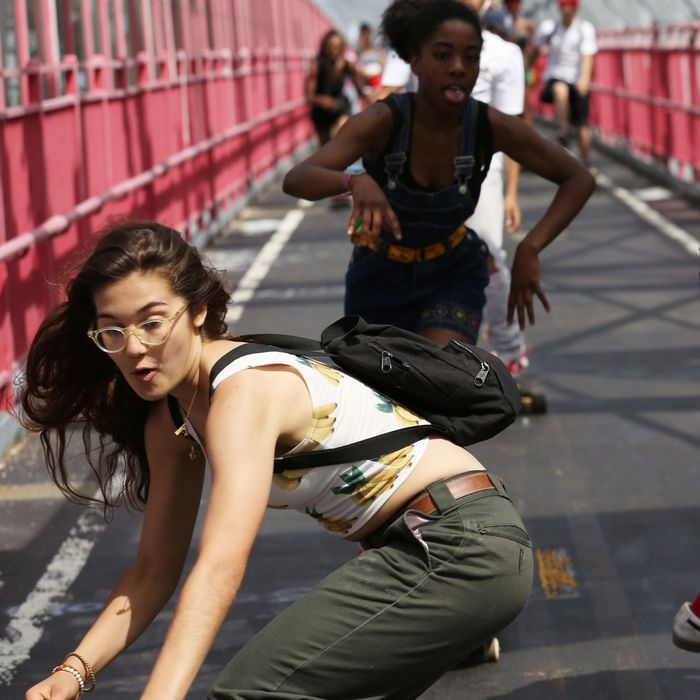

His unreadable face and evasive attitude, as infuriating as they are, only make him more mysterious and attractive in her eyes. Camille becomes infatuated with Devon (Jaden Smith), the pretty boy at the skatepark who seems to have noticed her too. That the first real source of a problem in the film comes from a boy would seem cliched if it didn't ring so true. It is a hopeful image of a generation of young women with the guts to be themselves and love each other as they please. Watching this eclectic assemblage of badass girls – several of them black, some of them queer, each with their own very strong sense of style – we too feel liberated. Skate Kitchen is a real skating group, and Moselle spent a long time with them before making her film she has an eye for catching not only their skating tricks but also their every look and gesture.Īccepted by the group, Camille opens herself up to new friendships and encounters.

Instead of staying at home, she tentatively approaches the intimidatingly cool women at the skatepark. But beneath her good-girl demeanour lies a secret desire to get out of her loneliness and into the world, as scary as it may be.Ĭamille carries on skating after the accident of the films opening, despite her mother forbidding her to do so. Camille is almost afraid of them, and understandably so: in the films early moments, she doesn't seem to fit in she is terribly shy, and her soft features and long hair make her look even more innocent. As relaxed as they look, we can tell from their tough-as-nails attitude and total lack of bashfulness or shame that these young women have fought hard to establish themselves in the traditionally testosterone-heavy skateboarding environment. It's at a skatepark in New York City that the teenager first meets the brave members of the all-female Skate Kitchen group. But Moselle's atmospheric film doesn't aim to shock or condemn, and centres on a much more internal conflict than Clark's cult film did: Camille's coming-of-age story.

In its earliest scenes at least, Skate Kitchen is thus more of a hangout movie, and the resemblance to Larry Clark's Kids (1995) is striking. The girls of the Skate Kitchen collective find strength in each other, carving out a space for themselves where they don't have to fight to be respected, and can comfortably be their own, sometimes vulnerable selves. This is not the story of a 'strong female character' fighting misogynistic forces to do what she loves – it is both more realistic and more hopeful than that, focusing on the group of young female skateboarders in New York who eventually accept Camille as one of their own. But Skate Kitchen feels original and fresh in its lack of a preachy tone. Skating is too often a boys' club, the film makes that painfully clear. The boys at the skatepark laugh, thinking she's having her period, and Camille leaves. Skateboarding in the city, 18-year-old Camille (Rachelle Vinberg) falls off her board the accident isn't particularly spectacular, but Camille is hurt and soon begins to bleed from the crotch. The camera moves fluidly with the group as they take Manhattan, while Moselle’s documentary eye gives the film its grounded, observational realism.Ĭrystal Moselle's follow-up to her 2015 feature debut The Wolfpack begins with a stomach-churning scene that sets up both the film's defiant feminist tone and the risk-taking attitude of its heroine. The film’s best scenes, which resonate proudly with a sense of community and camaraderie, are when the crew are skating. There is darkness hanging around the edges of the film, but, while it does owe Larry Clark’s NYC classic a shoutout, this is definitely not Kids. When a boy skater (played by Jaden Smith) attracts Camille’s attention, things get complicated in the group, and she finds herself in a male world, sleeping on a sofa while guys at the other end of the room flick between nature docos, skate videos and porn. The diverse, staunchly independent group skate together and discuss life in bedroom hangouts, all the while carving out their own unique space at the park. Seeing that a crew she follows on Instagram are going to be at a Lower East Side skate park, she is there in a heartbeat, and not only proves her ability but quickly fits in with everyone. When Camille (Rachelle Vinberg), a lonely girl from Long Island, injures herself skateboarding, her mum bans her from ever skating again. 2018 Sundance, Seattle, Munich, Taipei, Wellington, Jerusalem, Stockholm, Mar del PlataĪ chance meeting on the New York subway between Crystal Moselle and the titular female Skate Kitchen crew led to this vibrant film about freedom and friendship, in which the real-life skaters play versions of themselves.


 0 kommentar(er)
0 kommentar(er)
